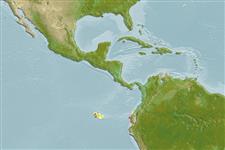Classification / Names
Common names | Synonyms | Catalog of Fishes(genus, species) | ITIS | CoL | WoRMS | Cloffa
Teleostei (teleosts) >
Blenniiformes (Blennies) >
Labrisomidae (Labrisomids)
Etymology: Paraclinus: Greek, para = the side of + Greek, klinein, kline = sloping and bed, due to the four apophyses of sphenoid bone (Ref. 45335).
Environment: milieu / climate zone / depth range / distribution range
Ecology
Marine; demersal; depth range 0 - 2 m (Ref. 13293). Tropical
Central eastern Pacific: Ecuador.
Size / Weight / Age
Maturity: Lm ? range ? - ? cm
Max length : 4.0 cm SL male/unsexed; (Ref. 13293); 8.4 cm SL (female)
Type specimen collected from tide pools (Ref. 46206).
Life cycle and mating behavior
Maturities | Reproduction | Spawnings | Egg(s) | Fecundities | Larvae
Springer, V.G. and T.M. Orrell, 1996. Catalog of type specimens of recent fishes in the National Museum of Natural History, Smithsonian Institution, 5: Chaenopsidae, Clinidae, Dactyloscopidae, Labrisomidae, and Tripterygiidae. Smithson. Contrib. Zool. 576:38. (Ref. 13293)
IUCN Red List Status (Ref. 130435)
Threat to humans
Harmless
Human uses
Tools
Special reports
Download XML
Internet sources
Estimates based on models
Phylogenetic diversity index (Ref.
82804): PD
50 = 0.5000 [Uniqueness, from 0.5 = low to 2.0 = high].
Bayesian length-weight: a=0.01000 (0.00244 - 0.04107), b=3.04 (2.81 - 3.27), in cm total length, based on all LWR estimates for this body shape (Ref.
93245).
Trophic level (Ref.
69278): 3.7 ±0.4 se; based on size and trophs of closest relatives
Fishing Vulnerability (Ref.
59153): Low vulnerability (10 of 100).
